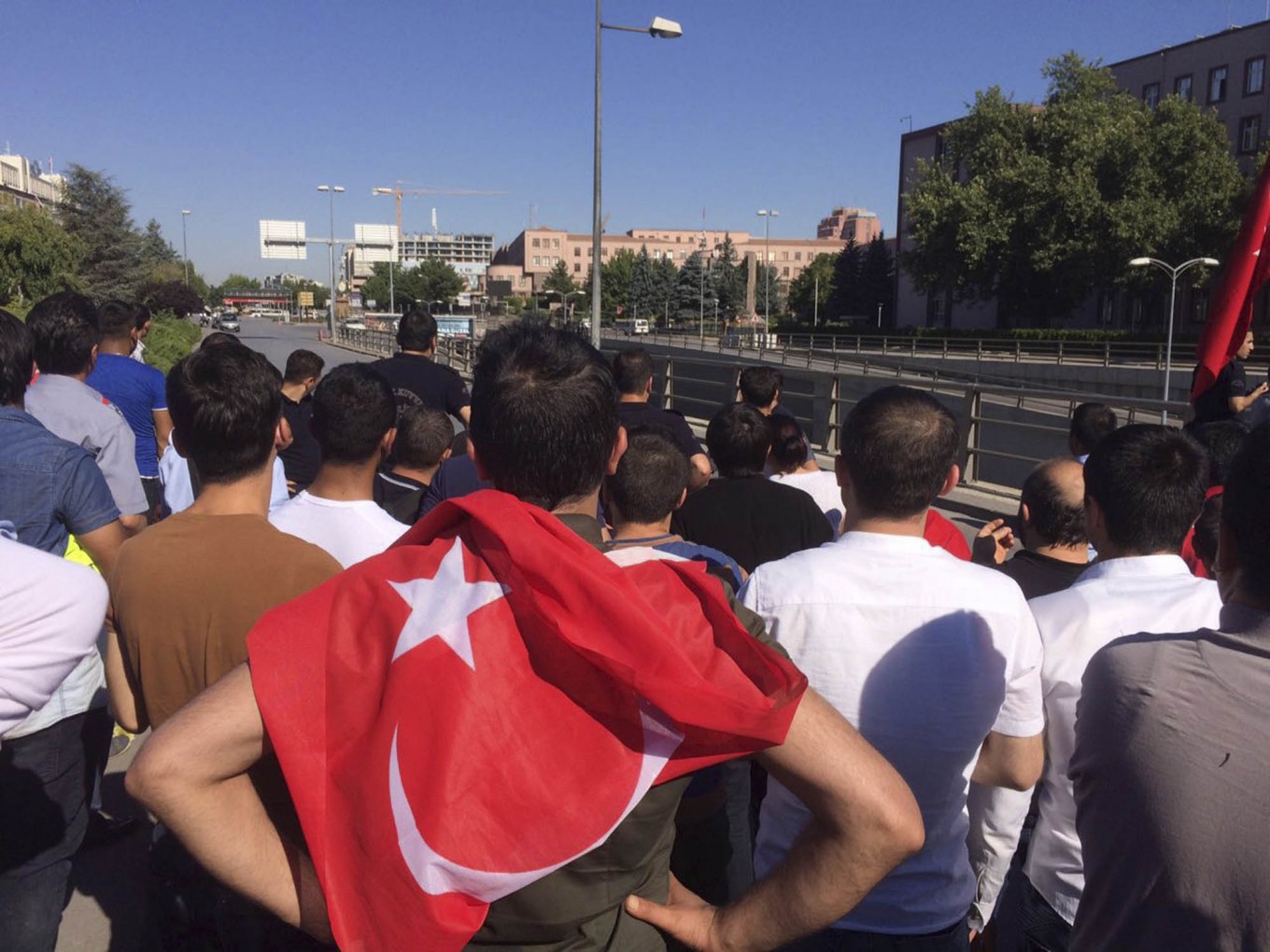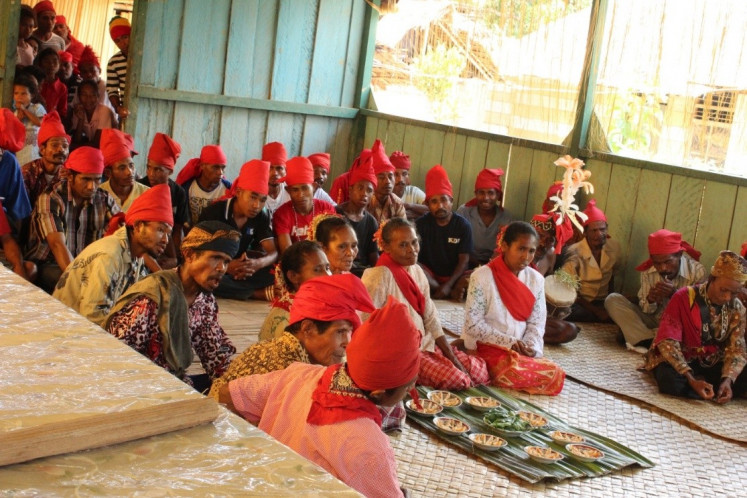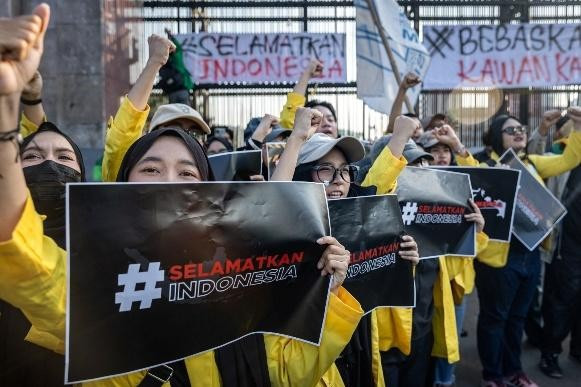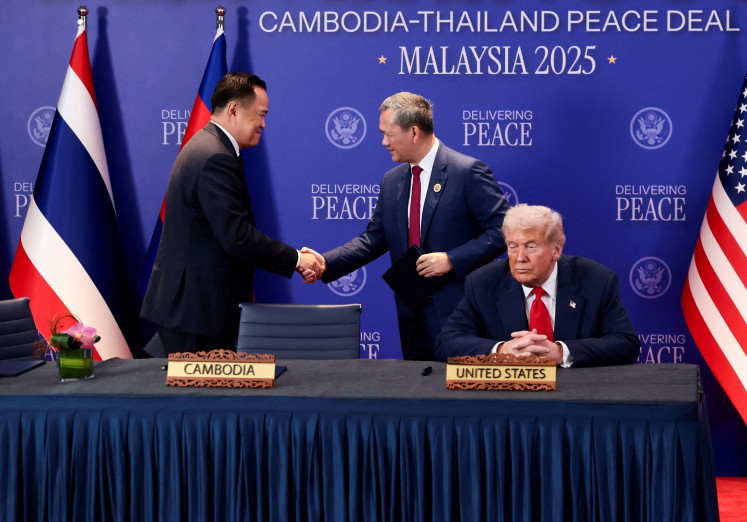Popular Reads
Top Results
Can't find what you're looking for?
View all search resultsPopular Reads
Top Results
Can't find what you're looking for?
View all search resultsTurkish economic model: Can it survive?
The attempted coup in Turkey that shocked the world last week, although failed, has raised disturbing questions with regard to the future of the Turkish model. This is a model that has received much praise from many intellectuals and pundits around the world.It is a model that has brought Turkey’s economy to be the 17th-largest economy in the world, and has tripled its per-capita income in a decade to US$10,500, three times the Indonesian per-capita income. And it is a model that has been shaped and carried out by an Islamist party, the Justice and Development Party (AKP), since 2002, when the AKP won a landslide victory in the general election.
Change text size
Gift Premium Articles
to Anyone
 People with the Turkish national flags gather outside the military headquarters in Ankara, Turkey, Saturday July 16, 2016. Turkish President Recep Tayyip Erdogan declared he was in control of the country early Saturday as government forces fought to squash a coup attempt during a night of explosions, air battles and gunfire that left dozens dead. (AP Photo/Burhan Ozbilici)
People with the Turkish national flags gather outside the military headquarters in Ankara, Turkey, Saturday July 16, 2016. Turkish President Recep Tayyip Erdogan declared he was in control of the country early Saturday as government forces fought to squash a coup attempt during a night of explosions, air battles and gunfire that left dozens dead. (AP Photo/Burhan Ozbilici)
T
he attempted coup in Turkey that shocked the world last week, although failed, has raised disturbing questions with regard to the future of the Turkish model. This is a model that has received much praise from many intellectuals and pundits around the world.
It is a model that has brought Turkey’s economy to be the 17th-largest economy in the world, and has tripled its per-capita income in a decade to US$10,500, three times the Indonesian per-capita income.
And it is a model that has been shaped and carried out by an Islamist party, the Justice and Development Party (AKP), since 2002, when the AKP won a landslide victory in the general election.
Although an Islamist party, AKP is committed to Western parliamentarian democracy, economic liberalism, globalization and joining the EU.
Turkey’s economic transformation actually started long before the AKP was conceived. The military, sensing the need for economic growth after a long period of slow growth, in 1983 appointed Turgut Ozal, a technocrat and a former World Bank employee, as prime minister.
A devout Muslim, Ozal ushered in a distinctive new blend of Muslim piety and business-friendly policy. He legalized Islamic banking and became the first serving Turkish prime minister to go on haj, and it was he who submitted Turkey’s application to join the EU in 1987.
When Ozal took charge in 1983, the economy was still plagued by the legacy of what was known as Kemalism. The state played a dominant role in the economy and protected favored industries with high tariffs, providing them with favorable exchange rates and subsidies.
These policies largely benefitted the big business elites in Istanbul, provided little opportunity for small and medium businesses and created few jobs for the lower and middle class workforce.
Ozal secured loans from the World Bank and the International Monetary Fund (IMF), and started restructuring the economy, implementing neo-liberal policies that favored decentralization, privatization, focus on export-led growth and redistribution of power from the state to the market.
Many industries were privatized and others that were not profitable were closed down. The economic power shifted from the Ankara-Istanbul axis of big businesses to the thriving textile and furniture manufacturers in in the Anatolian heartlands far removed from Istanbul.
In 2001 the year that the AKP was formed and one year before it became the governing party, Turkey’s economy was in free-fall. The Turkish lira had collapsed, losing 54 percent of its value, and the government’s intention to curb inflation and the lira’s steep fall jacked up interest rates, causing a sharp contraction in the economy. GDP shrank by 10 percent, and three million Turks became jobless.
Once in office, however, the AKP faced an uphill battle. Its first order of business was to impose a tough belt-tightening package demanded by the IMF as the price of restructuring Turkey’s massive foreign debts. Many expected the party would fail, but they were proved wrong.
The AKP wisely privatized many industries, promoted globalization and deepened Turkish economic and political ties to Europe.
Between 2002 and 2007, thanks to fiscal discipline and prudent macroeconomic management, its GDP nearly tripled from $230 billion to $660 billion, raising the Turkish economy to number seven in the rankings of the European economies and number 16 in the world.
Over the same period, exports went from $30 billion to $125 billion, while foreign direct investment grew at a mind-boggling rate, skyrocketing from just $1 billion to $42 billion.
The success in the economy made the AKP and its leaders hugely popular in Turkey, and the party won victories in the subsequent elections despite fierce opposition from the powerful military, which is staunchly nationalist and secular. But Islam in Turkey is conservative yet pro-Europe, pro-democracy and above all pro-capitalism.
Anatolian businesspeople combine religion, hard work and economic innovation in much the same way as did the Calvinist Burghers of northern Europe in the 16th century when capitalism was just starting out. Political scientists call this an “Islamic Calvinism”: an ethic of hard work and thrift committed to investment and economic growth, combined with strict piety and entrepreneurship.
Gone were the combative rhetoric and the demand for sharia government. In their place the AKP touted a pro-Western outlook, conservative but also favorable to democracy and markets.
Though the party was led by devout Muslims, they accepted secularism and vowed firm commitments to founding father Mustafa Kemal Ataturk’s legacy of modernization.
The AKP and its followers assert that they have abandoned the idea of transforming Turkey into a fundamentalist state. They are in favor of building a more open society, based on liberal democracy and economic development based on entrepreneurial capitalism and globalization.
Now the Turkish model is under severe pressure from several fronts. Global recession has slowed economic growth and has raised unemployment rates. This could destabilize the political system, challenging the AKP’s primacy.
It is facing a difficult geopolitical situation in neighboring countries, which are plagued by raging civil wars and sectarian conflicts. On the domestic front the government still has to cope with corruption allegations and growing protests against the authoritarian tendencies of President Recep Tayyip Erdogan.
The weekend’s attempted coup by a certain faction of the military may be an indication that the Kemalist legacy is not completely dead. All these have created uncertainties that could adversely affect investor sentiment and put Turkey’s economic growth at risk.
The question is then, can the Turkish model withstand the weight of pressure it is under now?
Many have seen how this mixture of Islamic piety and capitalist fervor has worked wonders for the Turkish economy. Now the world is anxiously watching to see whether the Turkish model is resilient in the face of its greatest challenges, and whether it could be a role model for other Muslim-majority countries — Indonesia included.
***
The writer is a commissioner of a publicly listed oil and gas service company. The views expressed are his own.
---------------
We are looking for information, opinions, and in-depth analysis from experts or scholars in a variety of fields. We choose articles based on facts or opinions about general news, as well as quality analysis and commentary about Indonesia or international events. Send your piece to community@jakpost.com.









